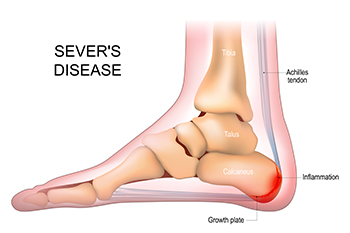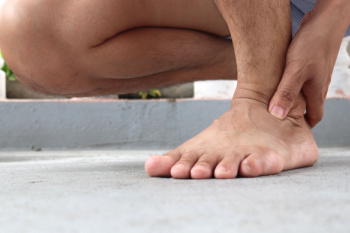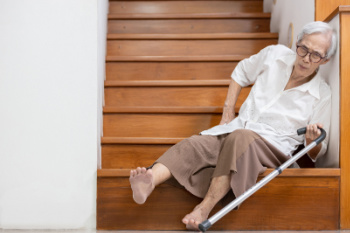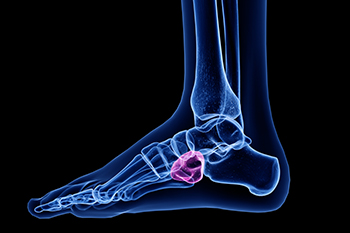
 (732) 246-1377
(732) 246-1377
 (732) 246-1377
(732) 246-1377
Sever's disease, also known as calcaneal apophysitis, is a foot condition in growing children, particularly those active in sports. It occurs when the growth plate in the heel becomes irritated, causing pain and swelling in the heel. Symptoms typically include pain at the back or bottom of the heel, especially after physical activity or prolonged standing. The pain may be sharp or aching, and the child may have difficulty walking or running without discomfort. A podiatrist can help diagnose Sever’s disease through a physical exam and may suggest treatments to alleviate pain and reduce inflammation. This type of doctor can provide guidance on stretching exercises, custom orthotics, or cushioned heel pads to help relieve pressure on the heel. In some cases, changes in footwear or activity level may be necessary to prevent further irritation. If your child has heel pain, it is suggested that you schedule an appointment with a podiatrist who can effectively manage Sever's disease.
Sever's disease often occurs in children and teens. If your child is experiencing foot or ankle pain, see one of our podiatrists from Livingston Footcare. Our doctors can treat your child’s foot and ankle needs.
Sever’s Disease
Sever’s disease is also known as calcaneal apophysitis, which is a medical condition that causes heel pain I none or both feet. The disease is known to affect children between the ages of 8 and 14.
Sever’s disease occurs when part of the child’s heel known as the growth plate (calcaneal epiphysis) is attached to the Achilles tendon. This area can suffer injury when the muscles and tendons of the growing foot do not keep pace with bone growth. Therefore, the constant pain which one experiences at the back of the heel will make the child unable to put any weight on the heel. The child is then forced to walk on their toes.
Symptoms
Acute pain – Pain associated with Sever’s disease is usually felt in the heel when the child engages in physical activity such as walking, jumping and or running.
Highly active – Children who are very active are among the most susceptible in experiencing Sever’s disease, because of the stress and tension placed on their feet.
If you have any questions, please feel free to contact our office located in North Brunswick, NJ . We offer the newest diagnostic and treatment technologies for all your foot and ankle injuries.

Peripheral neuropathy occurs when nerves outside the brain and spinal cord become damaged, disrupting signals between the brain, spinal cord, and the rest of the body. This can lead to numbness, tingling, burning, or weakness, often starting in the feet. Causes vary but include diabetes, infections, vitamin deficiencies, and prolonged pressure on nerves. People with neuropathy may struggle with balance, coordination, and even simple tasks like walking or sensing temperature changes. Over time, nerve damage can worsen, leading to foot injuries or ulcers that may go unnoticed due to reduced sensation. Treatment focuses on managing the underlying cause, relieving symptoms, and preventing complications. Medications, lifestyle changes, and targeted exercises can help improve nerve function. Proper foot care is essential to avoid further injury. If you are experiencing unexplained foot pain, numbness, or weakness, it is suggested that you see a podiatrist for evaluation and appropriate care.
Neuropathy
Neuropathy can be a potentially serious condition, especially if it is left undiagnosed. If you have any concerns that you may be experiencing nerve loss in your feet, consult with one of our podiatrists from Livingston Footcare. Our doctors will assess your condition and provide you with quality foot and ankle treatment for neuropathy.
What Is Neuropathy?
Neuropathy is a condition that leads to damage to the nerves in the body. Peripheral neuropathy, or neuropathy that affects your peripheral nervous system, usually occurs in the feet. Neuropathy can be triggered by a number of different causes. Such causes include diabetes, infections, cancers, disorders, and toxic substances.
Symptoms of Neuropathy Include:
Those with diabetes are at serious risk due to being unable to feel an ulcer on their feet. Diabetics usually also suffer from poor blood circulation. This can lead to the wound not healing, infections occurring, and the limb may have to be amputated.
Treatment
To treat neuropathy in the foot, podiatrists will first diagnose the cause of the neuropathy. Figuring out the underlying cause of the neuropathy will allow the podiatrist to prescribe the best treatment, whether it be caused by diabetes, toxic substance exposure, infection, etc. If the nerve has not died, then it’s possible that sensation may be able to return to the foot.
Pain medication may be issued for pain. Electrical nerve stimulation can be used to stimulate nerves. If the neuropathy is caused from pressure on the nerves, then surgery may be necessary.
If you have any questions, please feel free to contact our office located in North Brunswick, NJ . We offer the newest diagnostic and treatment technologies for all your foot care needs.

Falls pose a significant threat to the health of seniors, often leading to serious injuries such as fractures or head trauma. The risk of falling increases as balance and coordination naturally decline with age, making it harder for older adults to move safely. In addition to physical changes, issues like poor vision or medication side effects can contribute to the risk of falls. That is why it is vital for seniors to have regular eye exams to ensure their vision is sharp and clear. Properly correcting vision can significantly reduce the chances of missteps or accidents. Maintaining good balance through exercises like tai chi or strength training can also improve stability and reduce the risk of falls. In the home, removing clutter and installing safety features such as grab bars can further enhance safety. Falling can seriously impact foot health. If this has happened to you, it is suggested that you consult a podiatrist who can offer effective relief and treatment tips, and guide you on additional fall prevention techniques.
Preventing falls among the elderly is very important. If you are older and have fallen or fear that you are prone to falling, consult with one of our podiatrists from Livingston Footcare. Our doctors will assess your condition and provide you with quality advice and care.
Every 11 seconds, an elderly American is being treated in an emergency room for a fall related injury. Falls are the leading cause of head and hip injuries for those 65 and older. Due to decreases in strength, balance, senses, and lack of awareness, elderly persons are very susceptible to falling. Thankfully, there are a number of things older persons can do to prevent falls.
How to Prevent Falls
Some effective methods that older persons can do to prevent falls include:
Falling can be a traumatic and embarrassing experience for elderly persons; this can make them less willing to leave the house, and less willing to talk to someone about their fears of falling. Doing such things, however, will increase the likelihood of tripping or losing one’s balance. Knowing the causes of falling and how to prevent them is the best way to mitigate the risk of serious injury.
If you have any questions, please feel free to contact our office located in North Brunswick, NJ . We offer the newest diagnostic and treatment technologies for all your foot care needs.

Cuboid syndrome is a foot condition that involves the misalignment or dysfunction of the cuboid bone, which is located on the outer side of the midfoot. This misalignment can lead to pain and discomfort, particularly when walking or running. The causes of cuboid syndrome are varied and often linked to midtarsal instability, where the bones in the midfoot lose their normal alignment. Excessive body weight can also contribute, as it puts added pressure on the foot and increases the risk of injury. Poor footwear, such as shoes that do not provide adequate support, can worsen the condition by failing to properly stabilize the foot. Training on uneven surfaces or engaging in high-impact activities without proper foot care can further increase the risk of cuboid dysfunction. Additionally, a previous foot or ankle sprain may leave the foot vulnerable to developing cuboid syndrome, making proper recovery and prevention measures essential for foot health. If you have pain in this part of your foot, it is suggested that you contact a podiatrist who can provide a proper diagnosis and treatment.
Cuboid syndrome, also known as cuboid subluxation, occurs when the joints and ligaments near the cuboid bone in the foot become torn. If you have cuboid syndrome, consult with one of our podiatrists from Livingston Footcare. Our doctors will assess your condition and provide you with quality foot and ankle treatment.
Cuboid syndrome is a common cause of lateral foot pain, which is pain on the outside of the foot. The condition may happen suddenly due to an ankle sprain, or it may develop slowly overtime from repetitive tension through the bone and surrounding structures.
Causes
The most common causes of cuboid syndrome include:
Symptoms
A common symptom of cuboid syndrome is pain along the outside of the foot which can be felt in the ankle and toes. This pain may create walking difficulties and may cause those with the condition to walk with a limp.
Diagnosis
Diagnosis of cuboid syndrome is often difficult, and it is often misdiagnosed. X-rays, MRIs and CT scans often fail to properly show the cuboid subluxation. Although there isn’t a specific test used to diagnose cuboid syndrome, your podiatrist will usually check if pain is felt while pressing firmly on the cuboid bone of your foot.
Treatment
Just as the range of causes varies widely, so do treatments. Some more common treatments are ice therapy, rest, exercise, taping, and orthotics.
If you have any questions, please feel free to contact our office located in North Brunswick, NJ . We offer the newest diagnostic and treatment technologies for all your foot care needs.